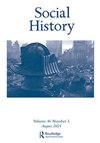Patricians, plebeians and parishioners: parish elections and social conflict in eighteenth-century Chelsea
IF 1.1
1区 历史学
Q1 HISTORY
引用次数: 0
Abstract
ABSTRACT This article sheds new light on social relations in early eighteenth-century Britain through a case study of three parish elections held in Chelsea between 1708 and 1723. The results of these elections were disputed in the ecclesiastical courts, generating over 400 folio pages of witness depositions. These depositions reveal a sustained conflict between the local gentry and the middling sort over control of parish offices. At the heart of this conflict was a contest over who could be considered an independent voter. Independence was the central quality required for participation in parish politics and was thought to belong exclusively to heads of household who contributed to local taxes. In election disputes, each side claimed that their opponents’ supporters failed to meet these criteria and that they had benefited from the votes of people who were too poor to make independent political choices. By arguing over voter independence, Chelsea residents contested the boundary between ‘parishioners’ with a right to participate in local government and the poor who were excluded by their dependence on others. Parish elections were both manifestations of social hierarchy and key sites of social conflict.贵族、平民和教区居民:18世纪切尔西的教区选举和社会冲突
本文通过对1708年至1723年间在切尔西举行的三次教区选举的个案研究,对18世纪早期英国的社会关系有了新的认识。这些选举的结果在教会法庭上引起争议,产生了400多页的证人证词。这些证词揭示了地方贵族和中产阶级之间关于教区办公室控制权的持续冲突。这场冲突的核心是关于谁可以被视为独立选民的争论。独立是参与教区政治所需的核心品质,被认为只属于为地方纳税的户主。在选举纠纷中,每一方都声称对手的支持者不符合这些标准,他们从那些太穷而无法独立做出政治选择的人的选票中受益。通过对选民独立性的争论,切尔西的居民争夺了有权参与当地政府的“教区居民”和因依赖他人而被排除在外的穷人之间的界限。教区选举既是社会等级制度的表现,也是社会冲突的关键场所。
本文章由计算机程序翻译,如有差异,请以英文原文为准。
求助全文
约1分钟内获得全文
求助全文
来源期刊

Social History
HISTORY-
CiteScore
1.10
自引率
0.00%
发文量
37
期刊介绍:
For more than thirty years, Social History has published scholarly work of consistently high quality, without restrictions of period or geography. Social History is now minded to develop further the scope of the journal in content and to seek further experiment in terms of format. The editorial object remains unchanged - to enable discussion, to provoke argument, and to create space for criticism and scholarship. In recent years the content of Social History has expanded to include a good deal more European and American work as well as, increasingly, work from and about Africa, South Asia and Latin America.
 求助内容:
求助内容: 应助结果提醒方式:
应助结果提醒方式:


